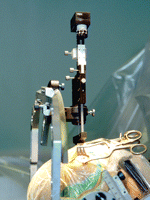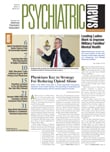They are among the most hopeless of the hopeless, those patients with deep and lasting depression that cannot seem to be conquered despite aggressive treatment. Estimates of the number of patients suffering from major depressive disorder who do not respond to antidepressants and other therapies vary, since studies used various definitions of treatment resistance, and misdiagnosis or inadequate treatment may play a part.
Nevertheless, treatment-resistant depression comprises a significant realm of psychiatric illness and one that is ripe for application of neurological devices, such as those for vagus nerve stimulation and repetitive transcranial magnetic stimulation, both of which are approved by the Food and Drug Administration (FDA) for treatment of major depression.
Deep brain stimulation (DBS) is another such intervention, a targeted therapeutic alternative for treatment-resistant depression that involves the bilateral placement of electrodes at specific neuroanatomical sites to deliver continuous stimulation from a subcutaneously implanted pulse generator.
The FDA has already approved DBS as a treatment for neurologic disorders, including essential tremor, Parkinson's disease, dystonia, and severe obsessive-compulsive disorder. In the March 2005 Neuron, researchers Helen Mayberg, M.D., and colleagues initially reported six-month outcomes for six patients who received DBS to the subcallosal cingulate gyrus (Brodmann's area 25) for treatment-resistant depression. They subsequently reported, in the September 2008 Biological Psychiatry, on 12-month outcomes in an expanded sample of 20 patients (Psychiatric News, September 5, 2008).
In the February American Journal of Psychiatry, they presented data on the extended follow-up of these 20 patients, with data from three to six years after DBS implantation. "Given the invasive and experimental nature of DBS for [treatment-resistant depression], it is particularly important to obtain long-term effectiveness and safety data," said the researchers.
Inclusion criteria for participants were a DSM-IV-TR diagnosis of major depressive disorder, with a current major depressive episode of longer than one year and documented nonresponse to at least four adequate treatment trials (which could include pharmacotherapy, ECT, and evidence-based psychotherapy). The 17-item Hamilton Rating Scale for Depression (HAM-D) was also used, with inclusion criteria of a HAM-D score of 20 or higher.
After an initial 12 months of DBS, patients were seen annually and then at a last follow-up visit between September 1, 2009, and December 30, 2009, to assess depression severity, functional outcomes, and adverse events. At baseline, 12 months, and the last follow-up visit, the 36-item Short-Form Health Survey Questionnaire (SF-36) was completed in addition to the HAM-D.
Overall results of the study were favorable: The percentage of patients who responded with improved HAM-D scores was 62.5 percent after one year, 46.2 percent after two years, 75 percent after three years, and 64.3 percent at last follow-up visit. Patients who responded positively to DBS required less medication after DBS implantation, either in dosage or in number of medications. The rate of employment at the time of DBS surgery was 10 percent, and that rate increased to 50 percent by the end of the first year and onward. Three patients also began doing volunteer work, resulting in 65 percent of patients being engaged in work-related activities by the end of the study.
The authors acknowledged the possibility that the symptom improvements were due to placebo effect of the nonspecific aspects of psychiatric care, but countered that "sustained antidepressant response for longer than three years in a cohort of patients with [treatment-resistant depression] is inconsistent with a placebo response, particularly when battery failure [as occurred in some patients] was associated with return of symptoms."
The results are encouraging, but caveats are required. Three of the original cohort of 20 patients died during the study, one from unrelated and previously undiagnosed colon cancer. Despite achieving remission for extended periods during the study, suicide was a likely cause of death for the other two patients, although an accidental overdose could not be ruled out in one of the patients. Both patients were being actively monitored by their psychiatrists.
"The death of two patients by suspected suicide suggests use of caution and reinforces the need for long-term psychiatric management, including psychosocial and pharmacologic therapies, in combination with DBS," the researchers pointed out. "These data suggest that in the long term, DBS remains a safe and effective treatment for [treatment-resistant depression], but additional trials with larger samples are needed to confirm these findings."

